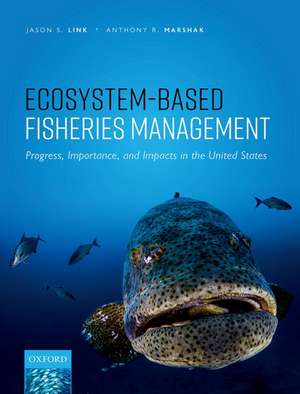Ecosystem-Based Fisheries Management: Progress, Importance, and Impacts in the United States
Autor Jason S. Link, Anthony R. Marshaken Limba Engleză Hardback – 5 noi 2021
Preț: 693.20 lei
Preț vechi: 913.70 lei
-24% Nou
Puncte Express: 1040
Preț estimativ în valută:
132.65€ • 141.84$ • 110.60£
132.65€ • 141.84$ • 110.60£
Carte disponibilă
Livrare economică 17-22 martie
Preluare comenzi: 021 569.72.76
Specificații
ISBN-13: 9780192843463
ISBN-10: 019284346X
Pagini: 712
Ilustrații: 250 colour line figures and illustrations
Dimensiuni: 197 x 254 x 40 mm
Greutate: 1.77 kg
Editura: OUP OXFORD
Colecția OUP Oxford
Locul publicării:Oxford, United Kingdom
ISBN-10: 019284346X
Pagini: 712
Ilustrații: 250 colour line figures and illustrations
Dimensiuni: 197 x 254 x 40 mm
Greutate: 1.77 kg
Editura: OUP OXFORD
Colecția OUP Oxford
Locul publicării:Oxford, United Kingdom
Recenzii
This book provides solid and practical support for ecosystem-based thinking applied to fisheries management in US aquatic ecosystems. It is highly recommended as a reference for a wide readership, especially fisheries and policy experts, to support the construction of more bridges between these worlds—that is essential for all of us.
This book is highly recommended as a reference for a wide readership, especially fisheries and policy experts, to support the construction of more bridges between these worlds—that is essential for all of us.
Are we finally there? The writing has been on the wall for decades, EBFM is coming! But only now do Link and Marshak demonstrate that we actually can walk the walk, drawing eminently upon case studies to provide lessons for making EBFM operational. We have made progress, and Link and Marshak are at the forefront of the development as demonstrated through this book.
EBFM has been recognized as a necessary approach to balancing exploitation and ecosystem health for more than 20 years now. There is a lot written about its mixed implementation to date so having an objective assessment of true progress is refreshing and timely. The credentials of Marshak and Link lay considerable weight to the assessment, both have been major contributors bedding down and moving practical EBFM forward in America and more widely.
EBFM is an essential step in ensuring that fisheries are managed in a way to maintain ecosystems ability to continue to contribute to human well-being. Understanding what has been done in US fisheries to move towards EBFM is an important step to refining how to implement EBFM, and there is no one better able to tell this than Link and Marshak.
Ecosystem-based approaches to fisheries management are a keystone element to achieve the diverse goals that people have for ocean systems globally. In order to make progress in implementing ecosystem-based approaches, it is critical to evaluate the efforts to date, recognizing how social and environmental factors shape both the form and the outcomes of EBFM in different places around the world. Jason Link and Tony Marshak are at the frontier of this type of assessment.
This book is highly recommended as a reference for a wide readership, especially fisheries and policy experts, to support the construction of more bridges between these worlds—that is essential for all of us.
Are we finally there? The writing has been on the wall for decades, EBFM is coming! But only now do Link and Marshak demonstrate that we actually can walk the walk, drawing eminently upon case studies to provide lessons for making EBFM operational. We have made progress, and Link and Marshak are at the forefront of the development as demonstrated through this book.
EBFM has been recognized as a necessary approach to balancing exploitation and ecosystem health for more than 20 years now. There is a lot written about its mixed implementation to date so having an objective assessment of true progress is refreshing and timely. The credentials of Marshak and Link lay considerable weight to the assessment, both have been major contributors bedding down and moving practical EBFM forward in America and more widely.
EBFM is an essential step in ensuring that fisheries are managed in a way to maintain ecosystems ability to continue to contribute to human well-being. Understanding what has been done in US fisheries to move towards EBFM is an important step to refining how to implement EBFM, and there is no one better able to tell this than Link and Marshak.
Ecosystem-based approaches to fisheries management are a keystone element to achieve the diverse goals that people have for ocean systems globally. In order to make progress in implementing ecosystem-based approaches, it is critical to evaluate the efforts to date, recognizing how social and environmental factors shape both the form and the outcomes of EBFM in different places around the world. Jason Link and Tony Marshak are at the frontier of this type of assessment.
Notă biografică
Jason S. Link is Senior Scientist for Ecosystem Management with the National Oceanic and Atmospheric Administration's (NOAA) National Marine Fisheries Service (NMFS), USA. In this role, he leads approaches and models to support development of ecosystem-based management plans and activities throughout the agency, serving as the agency's senior-most authority on ecosystem science. Dr. Link holds an adjunct faculty position at the School for Marine Science and Technology at the University of Massachusetts, is a fellow of the American Institute of Fishery Research Biologists, and has received a Department of Commerce Bronze Medal and the Fisheries Society of the British Isles Medal for significant advances in fisheries science.Anthony R. Marshak is Program Analyst with CSS, Inc. in support of the National Oceanic and Atmospheric Administration's National Centers for Coastal Ocean Science (NCCOS), USA. Prior to this role, he worked as a Research Associate in the NMFS Office of Science and Technology where his duties included co-leading its habitat science program, organizing workshops and symposia, and collaborating with the NMFS Senior Scientist for Ecosystem Management. Dr. Marshak has conducted research on a variety of topics including coral reef fisheries ecology, climate-related range shifts, the effects of marine protected areas, and socioecological studies related to ecosystem-based management.
